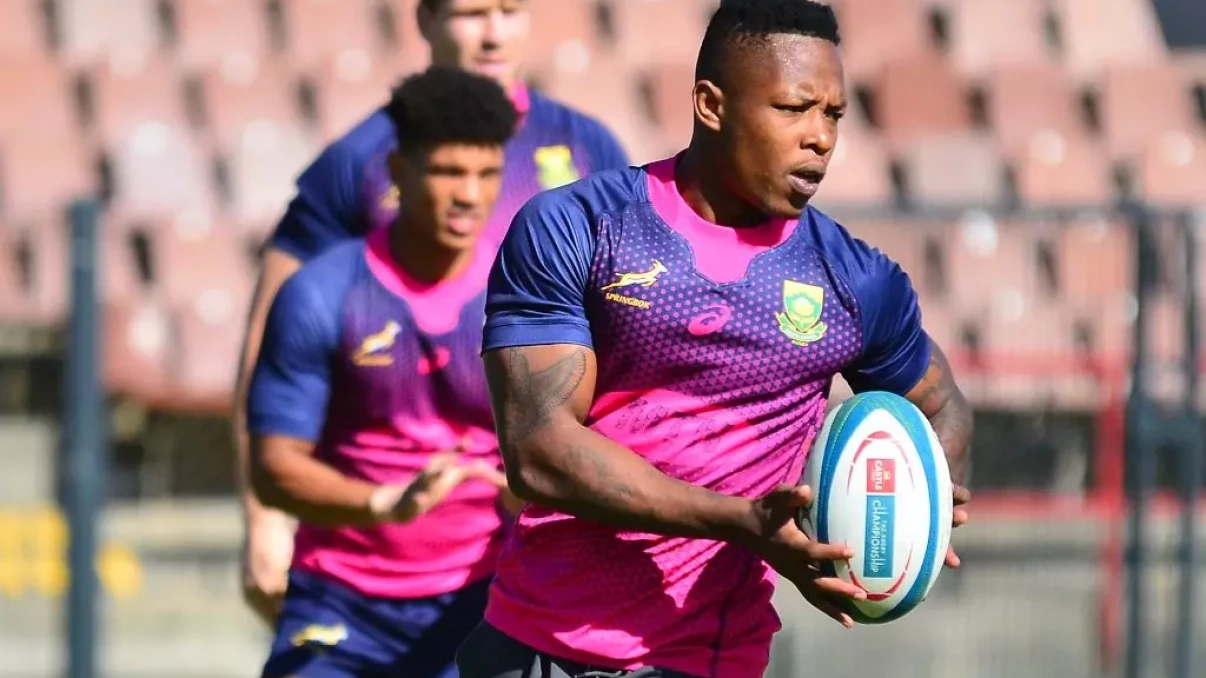Sbu Nkosi to take indefinite break from rugby amid mental health battle
 By
SABC Sport
By
SABC Sport
6th December 2022

Bulls and Springbok winger Sbu Nkosi has admitted his recent disappearing act was due to mental health struggles, as the pressures of life and rugby were getting to be "too much".
Bulls and Springbok winger Sbu Nkosi has admitted his recent disappearing act was due to mental health struggles, as the pressures of life and rugby were getting to be "too much".
Nkosi was finally located at his stepfather's home in Emalahleni, Mpumalanga, on Monday after vanishing without a trace on November 11 and failing to respond to calls from friends, family, or his Bulls colleagues.
The Bulls eventually grew concerned enough to open up a case with the police, but it was only when the story broke in the media late last week that information about his whereabouts slowly started to trickle in and he was ultimately tracked down.
Speaking to Sport24 on Tuesday, Nkosi admitted his move from the Sharks to the Bulls earlier this year had proven to be a much tougher challenge than expected, contributing to his mental health struggles.
"I was trying to turn a new leaf with my move to the Bulls and it's been a bit tougher than I anticipated it to be. I just needed the break because it was getting too much," said the 26-year-old.
"I felt I needed to get away from everything and everyone. I was worried about [people being concerned about me] but you can't pour from an empty cup, so I needed to fill mine up."
Nkosi had nothing bad to say about his time with the Bulls but it's clear there will be no quick return to action for the winger, whether for his franchise or the Boks, as he takes an indefinite break from the game to continue working on his mental health.
"I have only good things to say about the franchise. The people there are very good people. It pains me that I couldn't hold it down for longer," he said.
"Those were proud moments for me. I'm sorry to the people who brought me over to make a difference. I'm sorry that they brought me when I was in this stage of my life."
Bulls Chief Executive Edgar Rathbone personally traveled to Emalahleni to meet and talk with Nkosi on Monday, and while he would not divulge the details of their conversation, he praised Nkosi for having the "incredible courage" to admit that he "was not okay", as he pledged the Bulls help and support going forward.
"We were thrilled to find Sbu and incredibly relieved to see that he was alive. Equally, we were saddened to see him in the state that he was in, a gentle soul who has somewhat seen his light dim owing to his current well-being," Rathbone told the media on Tuesday.
"I am however confident that we are in a good position to provide Sbu with the support he needs and that we should acknowledge his incredible courage to even say to us, that he is not okay. Because he does not owe us that and yet he did, a valuable lesson for me and those around Sbu and one day, this will be his story to champion and empower other men to find the courage and find power in accepting help when not okay."
Rathbone said he was not sure what the future held for Nkosi at the Bulls but now was not the time to make any final decisions.
"It's difficult to put a timeline on it. We need to give him his space to get back to full health," the CEO said.
"I said to him yesterday that our goal is to get him back on a rugby field and feeling like a champion again, even if that means it's not at the Bulls."
Nkosi was a key member of the World Cup-winning Springbok squad of 2019 following a series of impressive performances in the green and gold, and started for the Boks against Wales in the semi-final, but his international career was set back by injury and off-the-field issues.
Nevertheless, the Boks did not forget about Nkosi and he was initially selected in Jacques Nienaber's 35-man squad for the end-of-year tour before a rib injury suffered in a URC clash against the Sharks shortly before departure sadly ruled him out of contention.
Rathbone said the Bulls hope to use this moment as an opportunity to introduce "support mechanisms" for players struggling with their mental health.
"We as the Vodacom Bulls will now be exploring, alongside our supportive partners, support mechanisms that we can introduce in our rugby community and this is hopefully the start of something great for South African rugby, because we are lucky today, but tomorrow, our intervention may be too late, and that is not something we want to see become a reality."








